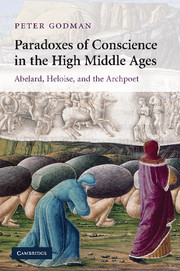Book contents
- Frontmatter
- Contents
- Preface and acknowledgements
- List of abbreviations
- 1 Moral moments
- 2 The neurotic and the penitent
- 3 True, false, and feigned penance
- 4 Fame without conscience
- 5 Cain and conscience
- 6 Feminine paradoxes
- 7 Sincere hypocrisy
- 8 The poetical conscience
- Envoi: Spiritual sophistry
- Bibliography
- Index of quotations
- General index
- CAMBRIDGE STUDIES IN MEDIEVAL LITERATURE
5 - Cain and conscience
Published online by Cambridge University Press: 30 September 2009
- Frontmatter
- Contents
- Preface and acknowledgements
- List of abbreviations
- 1 Moral moments
- 2 The neurotic and the penitent
- 3 True, false, and feigned penance
- 4 Fame without conscience
- 5 Cain and conscience
- 6 Feminine paradoxes
- 7 Sincere hypocrisy
- 8 The poetical conscience
- Envoi: Spiritual sophistry
- Bibliography
- Index of quotations
- General index
- CAMBRIDGE STUDIES IN MEDIEVAL LITERATURE
Summary
Cain, for the High Middle Ages, was not only the murderer of Abel. He was also a killer of the conscience. This anti-type of the penitent, obdurate in mortal sin, never failed to attract ignominy. St Augustine's founder of the earthly city was a figura of the Jews who crucified Christ for St Ambrose. Destined to wander, vagus et profugus (Genesis 4:12, 14), in a no man's land of alienation, the cursed outcast became the equivalent of a moral leper. Who would liken himself to Cain? Abelard, is the answer – at least twice in the HC. The one analogy is explicit and self-explanatory; the other, implicit in his account of the council of Soissons and its sequel, marks the point at which the subject endures a trauma of speechless alienation from God, from others, and from himself. There is no term in Latin to define this condition of moral muteness. Incapable of definition, it had to be evoked with the connotations of Cain. Abelard does so with a skill that was unmatched and remains unappreciated. His achievement is both conceptual and literary. As the subject of the HC, who had become the slave of fame, casts off the self-made chains that bound him, the narrator shows how he acquired a different moral identity.
‘Conscience’ is not used at this turning-point of the narrative; and those who have studied Abelard's ideas on the subject rarely take it into account. They confine themselves to what he states.
- Type
- Chapter
- Information
- Paradoxes of Conscience in the High Middle AgesAbelard, Heloise and the Archpoet, pp. 96 - 118Publisher: Cambridge University PressPrint publication year: 2009



